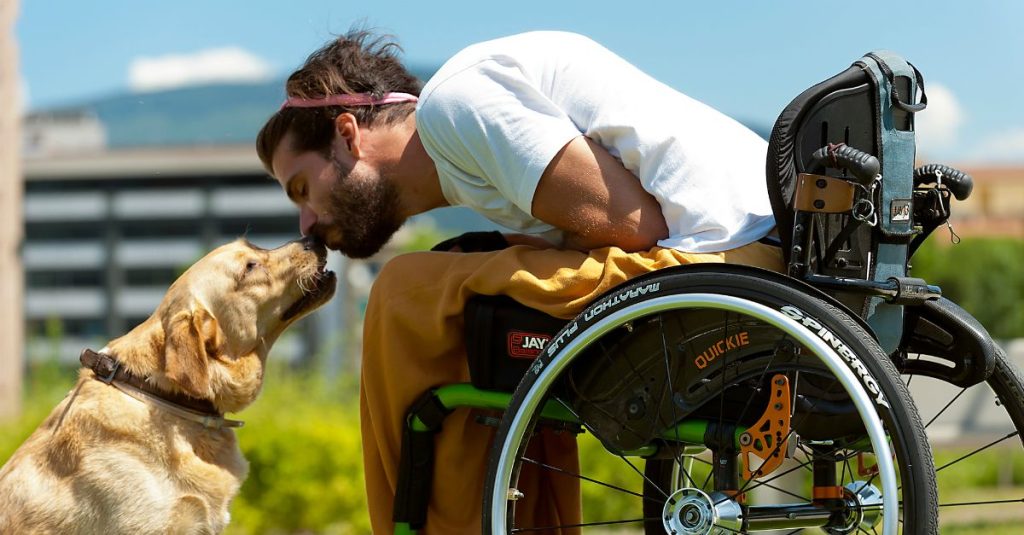Key Takeaways
Pets can provide emotional support, companionship, and even physical assistance to disabled individuals.
When choosing a pet, consider the individual’s physical abilities, allergies, and living situation.
Dogs, especially service dogs, are often the best choice for providing assistance and companionship.
Cats are low-maintenance and can adapt well to small living spaces, offering companionship and emotional stability.
Reptiles and small mammals can be great low-maintenance pet options for those with limited mobility.
Identifying the Ideal Pets for Disabled Individuals
Choosing the right pet for a disabled individual can significantly enhance their quality of life. The perfect pet should not only bring joy and companionship but also align with the person’s lifestyle and capabilities. Therefore, understanding the specific needs and abilities of the individual is crucial when making this decision.
“Pets for Adults with Disabilities …” from horizonprojectinc.org and used with no modifications.
Let’s delve into the key factors you should consider to ensure that the pet you choose is a good fit for both the individual and the pet itself.
Role of Pets in Enhancing Life for the Disabled
Pets play a vital role in improving the lives of disabled individuals. They offer more than just companionship; they can also provide emotional support and, in some cases, physical assistance. This is particularly true for service animals, which are specially trained to help with daily tasks.
For example, a service dog might help someone with mobility issues by retrieving dropped items or opening doors. This kind of assistance can make a significant difference in the daily life of a disabled person, fostering a sense of independence and confidence.
Factors to Consider When Choosing a Pet
When selecting a pet for a disabled individual, several factors must be taken into account. The choice should be guided by the individual’s needs, preferences, and living environment. Here’s what you should consider:
Physical Abilities: Assess the individual’s mobility and strength to ensure they can care for the pet properly.
Allergies: Consider any allergies the person might have to specific animals.
Living Situation: The size of the home and access to outdoor spaces can impact the suitability of certain pets.
By carefully considering these factors, you can make a well-informed decision that benefits both the individual and their new pet.
Physical Abilities and Lifestyle Compatibility
It’s essential to assess the physical abilities of the person who will be caring for the pet. Different disabilities affect mobility and strength in various ways. For instance, someone with limited mobility might find a small, low-maintenance pet like a cat or a small dog more manageable.
On the other hand, individuals with more mobility might be able to care for larger dogs, which can offer both companionship and physical assistance. Therefore, understanding the individual’s physical capabilities is crucial in selecting a pet that will complement their lifestyle.
Allergies and Sensitivities
Allergies are another critical factor to consider when choosing a pet. Some people are allergic to pet dander, which can cause discomfort and health issues. Therefore, it’s essential to verify whether the individual has any known allergies to animals.
If allergies are a concern, hypoallergenic breeds or pets that shed less, such as certain dog breeds or reptiles, might be better options. This ensures that the individual can enjoy the companionship of a pet without compromising their health. For more ideas, consider exploring low maintenance pets for people with limited mobility.
Pet’s Energy Levels and Temperament
The energy level and temperament of the pet should match the lifestyle and needs of the disabled individual. For example, high-energy pets may require more physical activity, which might not be feasible for someone with limited mobility. In such cases, consider lower-energy pets that are known for their calm demeanor.
Here are some characteristics to look for in a suitable pet:
Gentle and Patient: Pets that are known for their gentle nature are often better suited for individuals with disabilities.
Easy to Train: Pets that are easy to train can adapt better to the individual’s needs and routines.
By aligning the pet’s energy levels and temperament with the individual’s lifestyle, you can ensure a harmonious relationship that benefits both parties.
Dogs: Loyal Companions and Helpers
Dogs are often considered the best companions for disabled individuals due to their loyalty, intelligence, and ability to be trained for specific tasks. They not only provide emotional support but can also assist with daily activities, making life more manageable and enjoyable. Dogs can sense when their owner is upset or in need of help, offering comfort and companionship during difficult times.
Moreover, dogs encourage physical activity, which can be beneficial for both the pet and the owner. Regular walks and playtime can improve cardiovascular health and boost mood. For disabled individuals, having a dog can also foster social interactions, as dog walking often leads to conversations with other pet owners.
One of the greatest advantages of having a dog is their ability to be trained as service animals. Service dogs can perform tasks such as opening doors, retrieving items, and even alerting their owner to medical emergencies like seizures or low blood sugar levels.
Additionally, dogs are known for their protective nature, providing a sense of security to their owners. This protective instinct can be especially comforting for individuals living alone, offering peace of mind and companionship.
“A service dog can be a life-changing addition to a disabled individual’s life, offering both practical assistance and emotional support.”
Service Dogs and Their Benefits
Service dogs are specially trained to assist individuals with disabilities. They can perform a variety of tasks that help their owners navigate daily life more independently. These tasks may include guiding visually impaired individuals, alerting deaf individuals to sounds, or providing physical support to those with mobility challenges.
Suitable Breeds for Mobility and Emotional Support
When it comes to selecting a breed for mobility and emotional support, certain breeds stand out for their temperament and trainability. Labrador Retrievers and Golden Retrievers are popular choices due to their friendly nature and intelligence. These breeds are highly trainable and eager to please, making them excellent service dogs.
Poodles are another great option, especially for individuals with allergies, as they are hypoallergenic. Poodles are known for their intelligence and versatility, making them suitable for a wide range of service tasks.
For emotional support, breeds like Cavalier King Charles Spaniels and French Bulldogs are known for their affectionate nature. These dogs thrive on companionship and can provide comfort and emotional stability to their owners.
Cats: Independent and Affectionate Partners
Cats make excellent pets for disabled individuals who prefer a more independent companion. Unlike dogs, cats do not require regular walks and can be left alone for longer periods, making them a suitable choice for those with limited mobility or a busy lifestyle.
Low-Maintenance and Calming Presence
Cats are known for their low-maintenance nature, requiring minimal grooming and exercise. They are also incredibly calming, often providing a soothing presence that can help reduce stress and anxiety. The act of petting a cat can release endorphins, promoting a sense of well-being.
Cats are generally content with indoor living, making them ideal for individuals who live in apartments or smaller homes. They can entertain themselves with toys or by watching the world go by from a window perch. For more insights, consider reading about low maintenance pets for people with limited mobility.
Besides that, cats are litter-trained, which eliminates the need for outdoor bathroom breaks. This can be a significant advantage for individuals with mobility challenges.
Self-sufficient and require less supervision
Provide emotional support through their calming presence
Suitable for small living spaces and indoor environments
Adaptability to Small Living Spaces
Cats are highly adaptable to various living environments. They can thrive in small apartments or houses without the need for a yard. This adaptability makes them a perfect choice for individuals who may not have access to outdoor spaces.
Reptiles: Unique Companions
Reptiles offer a unique and fascinating alternative for those seeking a low-maintenance pet. They are especially suitable for individuals with allergies, as reptiles do not shed fur or produce dander. Reptiles can be an excellent choice for someone who appreciates observing rather than interacting with their pet.
Minimal Care Requirements
Reptiles generally require less daily care compared to traditional pets like dogs and cats. Their primary needs include a suitable habitat with the correct temperature and humidity, as well as regular feeding and cleaning. This makes them an ideal choice for individuals who may not have the time or ability to engage in frequent pet care tasks.
For example, turtles and tortoises are known for their long lifespans and relatively simple care requirements. They can be a delightful addition to the home, providing years of companionship with minimal effort.
Popular Reptile Species for Pets
Some popular reptile species for pets include leopard geckos, bearded dragons, and corn snakes. These reptiles are known for their docile nature and ease of care, making them suitable for beginners.
Leopard geckos, for instance, are small, gentle, and require minimal space, while bearded dragons are interactive and enjoy being handled. Corn snakes are also a great option due to their calm temperament and manageable size.
Birds: Interactive and Entertaining
Birds can be wonderful companions for disabled individuals, offering both entertainment and interaction. Their vibrant personalities and ability to mimic sounds can provide endless amusement, making them a delightful addition to any household.
Parrots and Other Trainable Species
Parrots, such as African Greys and Budgerigars, are known for their intelligence and ability to learn tricks and mimic human speech. These birds can be trained to perform various tasks, providing both companionship and mental stimulation.
Besides parrots, other trainable species include cockatiels and lovebirds, which are smaller and require less space. These birds can form strong bonds with their owners, offering affection and companionship. For more information on choosing the right pet, check out this guide on how to choose a pet suitable for the disabled.
Considerations for Long Lifespan
When choosing a pet, it’s important to consider the lifespan of the animal. Some pets, like certain species of birds and reptiles, can live for several decades, requiring a long-term commitment. This can be beneficial for those looking for a lifelong companion, but it’s crucial to ensure that the individual can provide care throughout the pet’s life.
Small Mammals: Hamsters and Guinea Pigs
Small mammals like hamsters and guinea pigs are excellent options for those who want a pet that requires minimal space and maintenance. These animals are known for their gentle nature and can provide hours of entertainment and joy.
Easy Maintenance and Space Requirements
Small mammals are relatively easy to care for, making them suitable for individuals with limited mobility. They require simple habitats that can fit in small living spaces, and their diet consists mainly of pellets, hay, and fresh vegetables. Regular cage cleaning and feeding are manageable tasks that do not require extensive physical effort.
Benefits of Small Pets in Providing Joy
Despite their small size, these pets offer significant companionship and can bring joy to their owners. Watching them explore their environment and interact with toys can be both entertaining and relaxing. Moreover, they are excellent pets for teaching responsibility, as they require daily feeding and care.
Final Thoughts
Choosing the best pet for a disabled person involves careful consideration of the individual’s needs, lifestyle, and capabilities. The right pet can offer companionship, emotional support, and even physical assistance, enhancing the quality of life for both the pet and the owner.
It’s essential to research and consult with professionals or organizations that specialize in service animals or pet care to make an informed decision. This ensures that the pet chosen is a good match and can provide the desired support and companionship.
Personalizing Pet Choices for Fulfillment
Ultimately, the choice of pet should be personalized to fit the individual’s unique circumstances. Consider factors such as the level of care required, the pet’s temperament, and the individual’s living situation. By tailoring the choice to meet specific needs, you can ensure a fulfilling and rewarding relationship between the pet and the owner.
Remember, the goal is to enhance the individual’s life by providing a companion that offers joy, support, and love. A well-chosen pet can become a cherished member of the family, offering years of happiness and companionship.
Encouragement to Explore Assistance Resources
If you’re considering a service animal, reach out to reputable organizations that specialize in training and providing service dogs. These organizations can offer guidance and support throughout the process, ensuring that the pet you choose meets the individual’s needs.
Additionally, local shelters and rescue groups can be excellent resources for finding the perfect pet. They often have knowledgeable staff who can help match individuals with pets that suit their lifestyle and requirements.
Frequently Asked Questions (FAQ)
Here are some common questions about choosing the best pet for a disabled person:
What are the key benefits of having a pet for a disabled person?
Pets offer numerous benefits, including companionship, emotional support, and assistance with daily tasks. They can help reduce stress and anxiety, promote physical activity, and provide a sense of purpose and routine.
For those with mobility issues, service animals can perform tasks that enhance independence and confidence, improving overall quality of life.
Which dog breeds are recommended for emotional support?
Several dog breeds are known for their suitability as emotional support animals due to their gentle nature and ability to form strong bonds with their owners.
Labrador Retriever
Golden Retriever
Cavalier King Charles Spaniel
Poodle (standard or miniature)
French Bulldog
These breeds are known for their affectionate and loyal temperament, making them excellent companions for emotional support.
Are there any kinds of pets that would not be a good match for a disabled person?
While many pets can be suitable for disabled individuals, some may not be ideal due to their high energy levels, need for extensive care, or specific habitat requirements.
For instance, large, high-energy dog breeds or pets that require constant attention and training might not be the best choice for someone with limited mobility or time. Exotic animals with specialized care needs may also pose challenges.
It’s crucial to assess the individual’s capabilities and lifestyle to ensure the chosen pet can be cared for properly and safely.






